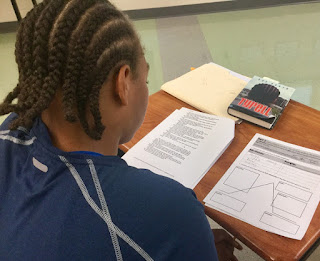Why I Accept Late Work for Full Credit
As I sat down to work on lesson plans on a cold, dreary Sunday afternoon, I thought a lot about my students and my beliefs about education. I've been listening to an Eleanor Roosevelt biography, and right now in the book, Europe is in World War II and the U.S. is preparing. While others want to focus solely on stopping dictatorships in Europe, Eleanor wants to focus on defining and defending the principles of democracy. In times of uncertainty and fear, it is easy to see everything we're against. However, I think the stronger way to proceed is to get clear on what we are for. If you've read many of my posts, you know I deeply believe in choice reading because I believe that all kids deserve to learn and grow. I believe strongly that literacy is a right for all.
I also believe that teachers need to be vigilant about practices in our own classes that become gatekeepers, allowing success for some, and holding others back. This post is dedicated to exploring one such gate-keeper: late work.
For a lot of us, the end of the semester means a rush, as we try to finish teaching all the things we set out to, and then try to get everything graded. And that's just school, right? We get pretty caught up in how busy we are.
Let's pause for just a minute and think about the kids in our classrooms. They have been working hard learning a variety of subjects since August, and are now facing final projects and exams. They've also got parents who begin checking grades more frequently and asking lots of questions. A lot of my students also have jobs that get busier around the holidays and want kids to work extra hours. All this creates a lot of stress for them too.
Then there are our students who struggle with school. They have shown us this in a variety of ways since August: difficulty understanding concepts, completing work, showing up to school, coming to class, keeping their thoughts inside their heads. They've challenged us to find ways to help them learn, to make school relevant and interesting, to be patient when tempers are hot.
All of our kids deserve to learn. And school is not a perfect fit for everyone. It can't be. Just like no one book will be perfect for every kid in our classroom, no one classroom is perfect for every kid.
What can we do? Probably a lot, but here is ONE simple suggestion to value learning for all kids as we wrap up this semester. We DO have time for this:
Take late work for full credit.
Really, all of it. About 10 years ago, I decided to change my late work policy. I simplified it to "All work is due by the end of the semester." Our real deadline is approaching: December 15th, the day before we start finals (and truth be told, if someone comes sprinting into my room during finals, all out of breath panting, "Here, Ms. Hagen. I finished this assignment," I will take it with a smile and a, "Wow! You must have worked hard!").Having one real deadline at the end does not prevent me from having project due dates along the way. We definitely have those, but I still take all work until the real deadline: the end of the semester. And, a lot of my students do get their work in on time. But when something isn't done, I simply remind students that they can still turn it in for full credit. They're often surprised (despite the fact that I don't hide my policy) and typically very nice about it, excited even. We make a plan, and they're on their way to get it done.
When I tell other teaches about my policy, they say things like "Doesn't that teach irresponsibility? Life has deadlines!" and "Wow! You must have a lot to grade at the end!" Actually, I have found neither of these things to be true. Typically, I only have a few kids at the end that are missing a lot of assignments. Most kids are missing very little.
What I have found are the huge benefits when my kids return second semester. They are better human beings and we have a stronger relationship. First, they've done the work, so they're not behind, and second, they know I'm there to help them, and they work harder for me. The big fear that they'll now do nothing all semester and turn it all in the last week has never happened to me.
When I don't take off points for late work, the grade students earn is also authentic. It reflects the objectives that were focused on. Parents get a clear picture of their student as a reader, writer, speaker and listener, not as a compliant, deadline-meeter. I find communicating with parents about late work during the semester to be far more effective than docking points at the end. Quick contact ahead of time wins support. Contact after it's late does not. Kids also don't need to argue that their grades are unfair, or that "the teacher gave me ___." Because I didn't. They actually got the grade their work deserved.
What I communicate to my students with this policy:
1) I know you are busy with life outside of school, and I am on your side. Let's work together and help you be as successful as possible.
2) There are real deadlines and arbitrary deadlines. I respect the real ones. I'm very honest with kids about this - I tell them that their best work will happen when they turn things in on time - while the unit is fresh in their minds. It will be harder to do this work later. That being said, I will take all work until the real deadline: the end of the semester.
3) I value learning above everything else. Deadlines don't matter as much as learning does. I want you to read and write everything you possibly can, so that you can be the best thinker you possibly can be.
I'm not going to tell you that all students in all my classes pass each semester. They don't. I still have a few that don't do anything or miss so much school, there is no way to get everything done. I still have kids with such poor quality work that they don't pass. However, I know that if a student doesn't pass, I did everything under the sun to help her, and I'll do the same the following semester. And in summer school. Hope keeps me going each day. I never know when and where any of my kids are going to decide that now's the time they want to learn. I have to be ready.
We have a choice in our classrooms about what we value. When we emphasize meeting deadlines as the most important thing in education, we emphasize compliance. When we emphasize learning by assigning meaningful work that we insist that students complete, we emphasize critical thinking and learning above all else. I want today's students to be people who contemplate what's important, to critically read about what's going on in the world, and to realize that each of their voices matter. We each have a chance to make sure none of our kids are left out. To quote Eleanor Roosevelt again, "It is better to light a single candle than to curse the darkness." Accepting late work for full credit just might be that one candle that makes a difference.




Comments
Post a Comment